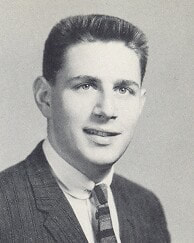David Rucci is a land guy. It’s genetic really. His grandfather Joseph, and generations before him, were steeped in the Italian countryside of Panni, resting in the Puglia Mountains with lush valleys beneath blue skies. A love of nature was hardwired into the Rucci family, and when Joseph landed in Stamford at the age of 11, that Italian countryside served as his barometer for natural beauty.
Years later when he looked to set down roots for he and his wife, Ida, Ponus Ridge offered a natural allure reminiscent of his hometown. Joseph and Ida settled there to raise seven kids who grew up combing the countryside for adventure. Joseph opened the Colonial Barber Shop in the heart of town where he came to know everybody, and their secrets.
All of the children attended the local public schools. Their eldest son Joe, David’s father, was a hometown boy. When it was time to go to college, he opted to stay close to his beloved New Canaan countryside and headed to Fairfield University. From there he ventured to Villanova School of Law, where he met his wife Debbie, and then on to the FBI’s law enforcement training and research center.
It was the 1960s, and his arrival in Quantico coincided with the escalating tensions of the Civil Rights movement. He was assigned to a satellite office in Mississippi. Newlywed, he and Debbie settled in Tupelo, where David was born. During his time in Mississippi, Joe was a key player in the case made famous by the film “Mississippi Burning” in which Klansmen, including a sheriff and his deputy, killed three noted Civil Rights workers.
After a few years, Joe was transferred to Jacksonville Florida, where he worked organized crime and civil rights cases. There he also was assigned the Barbara Mackel kidnapping case. Mackel was a student at Emory when she was buried in a coffin equipped with air pumps to keep her alive while her kidnappers negotiated a ransom.
Perhaps it was the arrival of his second child, or maybe it was that David was ready to enter school; maybe it was jumping out of an open-door helicopter, sniper rifle in hand, into the mangroves of the Everglades in search of a young woman buried alive; maybe it was a little of all of those things, but it was at that point that Joe decided to leave the FBI and head home to New Canaan.
Once back in town, Joe entered local politics and David headed to school. Like his father and his aunts and uncles, David and a posse of buddies on bikes spent long days on Oenoke Ridge, Logan Road and Turtleback and generally staying out of trouble down by the reservoir.
David was also drawn to the heart of town and the buzz of the barber shop where he swept the floors for his grandfather, caught wind of the town gossip, and stole next door to stock up on candy at Breslow’s.
David’s formative years left him with a deep connection to New Canaan’s scenery. Intent on infusing his love of the landscape into his work, he followed his father into law and built a career on property and land use law.
Like his father, he was a hometown boy and opened a hometown practice. He and his wife Bar started a family while living on Kimberly Place surrounded by other young families. The parents on the street were outnumbered and the neighborhood overrun by the more than 30 kids they shared between them. Halloween called for more than 800 pieces of candy as kids swarmed the neighborhood. David and Bar loved it.
While David worked to diffuse property disputes over fence lines, rights of way and bright light complaints, he also re-lived his youth by coaching his kids and their sports teams in soccer at Waveny, baseball at Weed Park, and basketball at the High School. He and his family eventually moved to the rolling hills of Valley Road where they could spread out a bit more, now his daughter babysits kids on Kimberly Place, which is still ruled by little kids running through the open doors.
The more he is in town, the more he appreciates the genius of those who designed it for their foresight in maintaining its aesthetic appeal with smaller zones in town that grow incrementally in concentric circles radiating from the heart of downtown. He also loves the charities committed to making the town so special.
Though his father Joe gravitated toward local politics, serving the community on the Town Council, David avoided politics instead serving on many local boards including the library, Rotary, the Community Foundation, and Staying Put.
On a typical day, you can find David and Joe, a couple of hometown boys, lunching in the heart of downtown where they have become staples in the community.

David Rucci, a third generation New Canaanite.

Joe Rucci’s photo in the NCHS Class of 1959 yearbook.